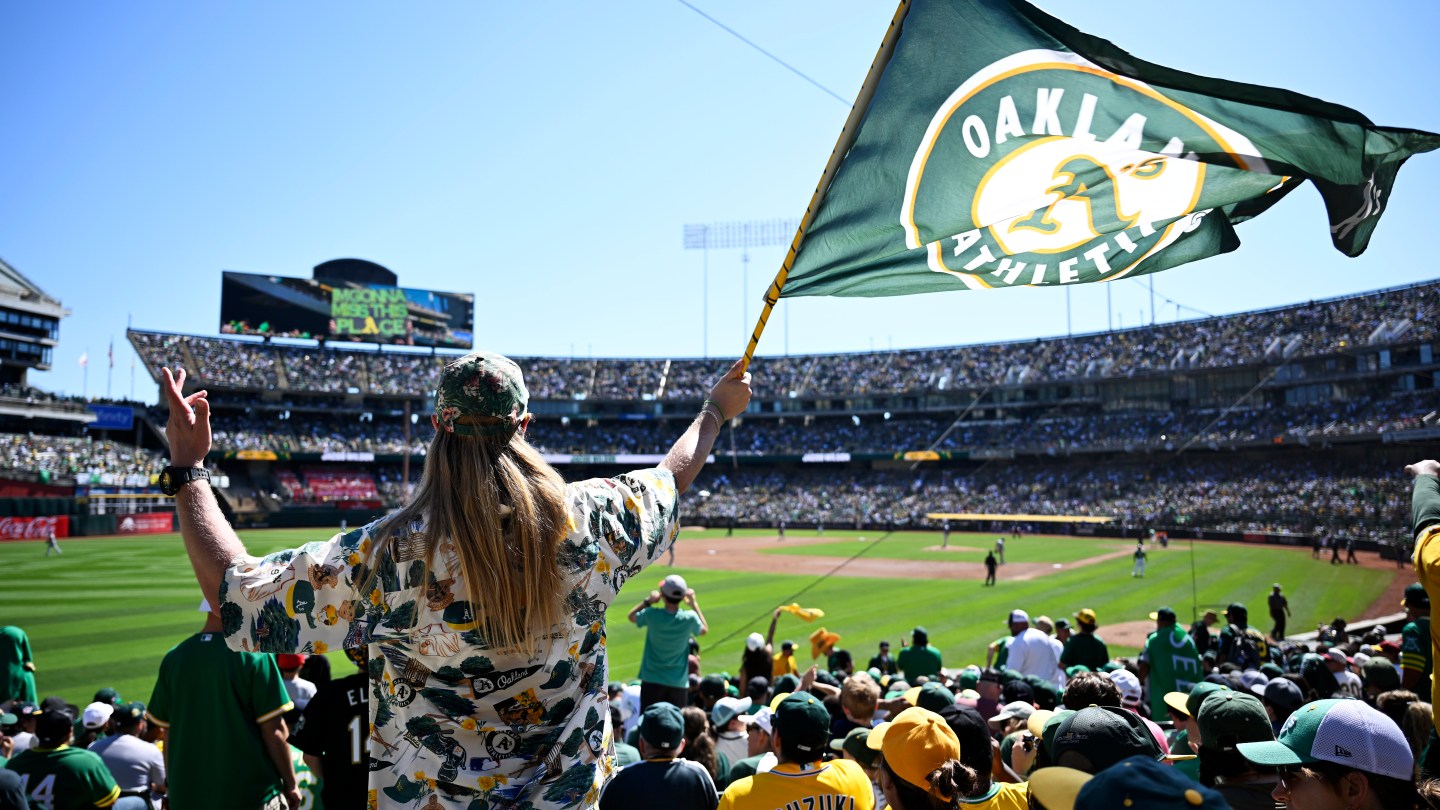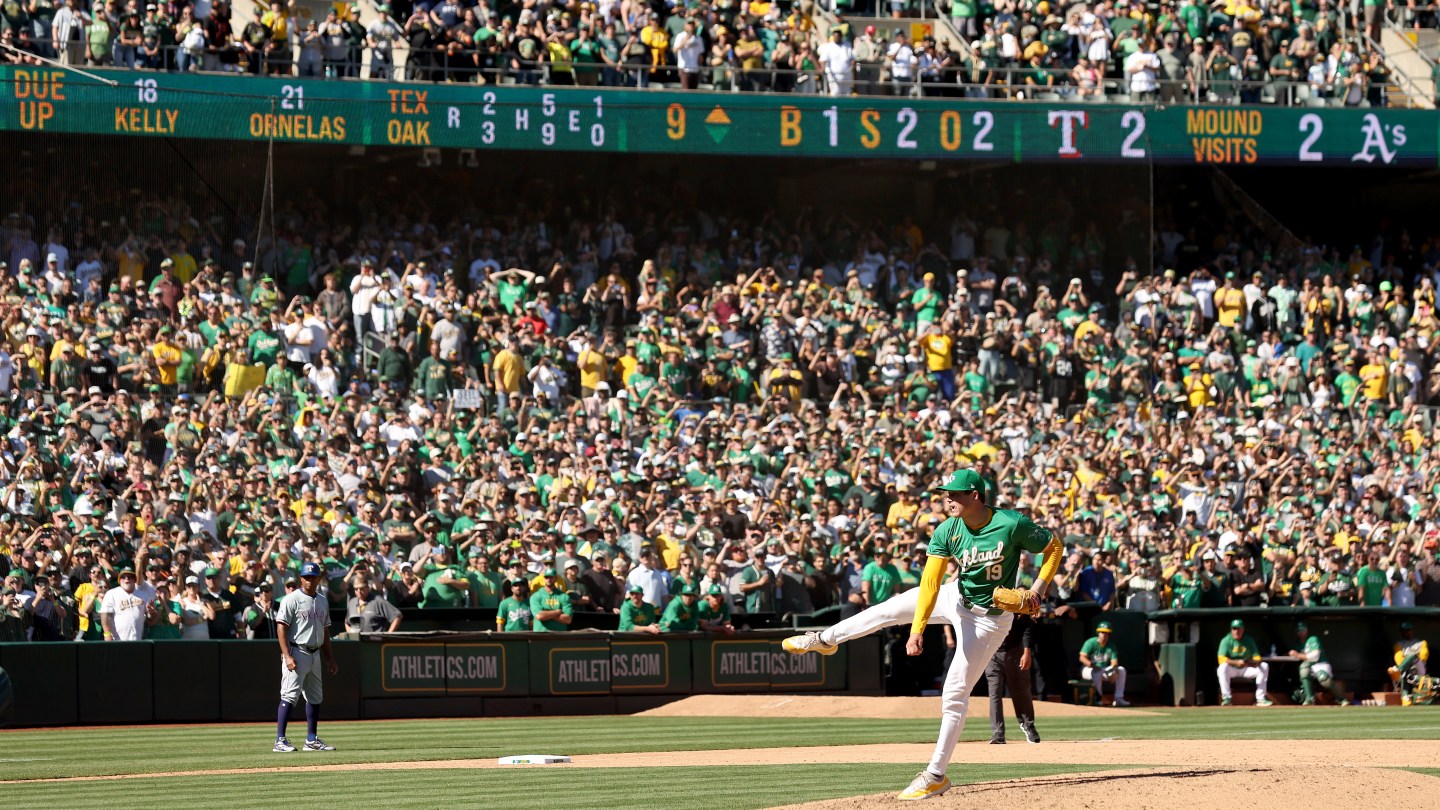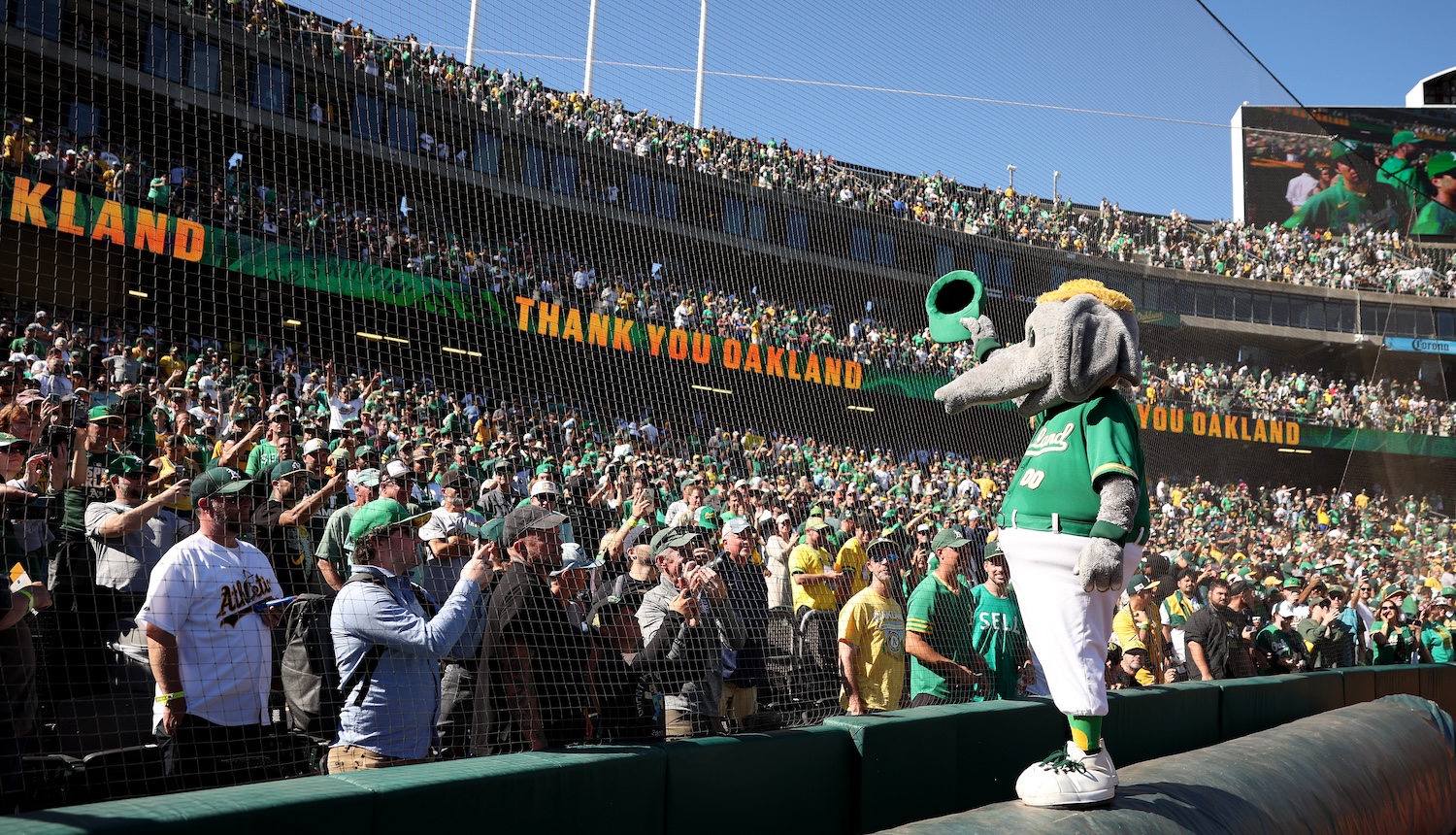OAKLAND, Calif. — Adam Curtis would have blushed at how obvious the metaphor was: As a thick stratum of cops and security guards ringed the foul lines, guarding the field and menacing outward toward 46,889 fans in attendance, the Oakland Coliseum PA blared "Celebration" for the last time. It was a final, fitting insult to fans of the Athletics, a team in the AL West that as of today used to play their home games in Oakland. Someone in the building, maybe only one single someone, had cause for celebration—not with the fans but at them.
With the future ripped away by John Fisher and the other owners who voted unanimously for this, what would the final major-league game on Oakland soil be like, I wondered? Would it be a party? A riot? How would the Oakland A's, an organization whose stated position to its own fans and the world at large for three years has been, more or less, We do not exist; do not regard us or our product, handle a sold-out crowd? It turns out that a fun funeral is still a funeral, and the energy that A's fans brought to the Coliseum served primarily to underscore the irrationality at the heart of the situation. They showed the baseball-watching world what the A's meant to them, while Fisher and his organization showed how little that mattered.
The gates to the Coliseum parking lot were supposed to open at 8 a.m., though fans showed up so early they backed up traffic on 880 and forced the lot to open an hour early. My train was packed three hours before the first pitch, and my final trip across the BART bridge to the Coliseum made the portal metaphor I've always played with slightly more literal, as a vendor was augmenting the usual supply of T-shirts and micheladas with psilocybin chocolates (a friend had bought and munched some the night before, and vouched for their efficacy).

The packed tailgate lot was soundtracked by Too $hort, Peso Pluma, the occasional metal riff, omnipresent Mac Dre, and a 12-piece banda group. Two fans in mourning veils walked around handing out black roses. I threw footballs and wiffle balls, chatted with bootleg T-shirt vendors and people selling tacos, and saw more TV journalists than I ever could have imagined would attend an A's game, including a crew from a Taiwanese outlet. A guy sipping champagne displayed a JOHN FISHER CAN BURN IN H*LL sign. A father and daughter shotgunned Modelos together. A security guard teared up as he presented his friend with three tickets, one of which was for his friend's child, whom he was meeting for the first time. Dallas Braden took photos and chatted with anyone willing to line up. I talked to a fan carrying around a roughly two-foot-tall framed photograph of someone standing on the Coliseum field in a crisp yellow A's jersey. It was their cousin, whom they used to attend A's games with before they died.
Every person I talked to and every person every other reporter talked to told a similar story (the best was this guy's). They loved the A's, they loved coming to A's games with their friends and family, they loved other A's fans, and they found John Fisher simultaneously disgusting and inscrutable. Fisher's venal nepo-kid origins are well established, and in Defector's case, elucidated at length by the Suetonius of Bay-area sordidness, but what I, and seemingly tons of other A's fans, find most chilling is his soul-deep indifference.
You can't make a straightforwardly rational case for Fisher's maneuverings; greed gets you so much of the way there, and the rest can only really be explained by cruelty or stupidity. Anyone who butts up against either of those two explanations, as every A's fan will for the rest of their lives, is going to take psychic damage. It was not just that the A's were being taken away, it was that they were being taken away under malicious, gnomic pretenses. A rich guy is ruining something in ways he neither cares about nor really understands, and for no good reason. That sounds too much like all the parts of life that the joy of sports is supposed to help ameliorate.
Inside, Barry Zito sang the national anthem, and local hero Marcus Semien led the game off for the visiting Rangers. Concessions were totally inaccessible to anyone unwilling to forfeit three of their final nine innings of Oakland A's baseball. My friend Seung somehow met a guy from Saskatchewan who'd flown down for the entire three-game series simply because he wanted to see something happen for the last time. In the fourth inning, fans behind home plate unleashed a huge white beach ball and the crowd successfully bounced it away from security all the way down the third base line, until it fell onto the field where a security guard pump-faked a pass back to the crowd once, twice, before unsheathing a knife and stabbing the balloon to death. Like I said, the metaphors were not subtle.

Thursday felt like a playoff game at 1.5x strength. Oakland has and has always had the capacity and willingness to furnish even a brutalist toilet like the Coliseum with a fantastic crowd when an event warrants one. It is necessary, I think, to frame this outpouring within the context of the past three seasons.
Until this past month, the Coliseum was a cemetery: largely closed off to the public; populated mostly by visitors and opossums; an aura of past glory that felt increasingly haunted; a large open space with plenty of crannies for couples to do semi-furtive sex stuff. The A's did this on purpose. Team payroll has always been one of the lowest in MLB, though after a good 2021, the club washed its hands of anyone who was too good in order to essentially stop functioning as a baseball team.
They entered a sort of parallel existence, playing ostensible major-league games only because they had to, and losing, while Fisher and organization president Dave Kaval got to work on their true goal, which was leaving Oakland. They jacked up ticket prices in order to repulse fans, and it worked. They bet that a protracted death would make people apathetic, and it worked. Which is to say, the last game may have happened on Thursday, but the Oakland Athletics died a long time ago. And yet they still had to play one last game. For Fisher, this was akin to throwing the funeral for a guy he killed.
People were there to make one last memory. The beer flowed, everyone took photos, and anger gave way to preemptive nostalgia. (A delightful moment: A guy taking a front-facing video of himself blasting a joint offered hits to two stadium workers and they gleefully took him up.) The in-stadium camera studiously avoided any fans wearing a SELL t-shirt or waving a flag, the person manning the PA gave a heartfelt goodbye, and the team offered expressions of gratitude to the fans it is leaving behind. The pending relocation, about which Fisher has tried to say as little as possible, was treated by everyone associated with the A's like something natural and implacable, like the weather. The A's aren't moving, the A's are being moved.
I found the tributes offensive. Any expression of gratitude was a lie. It's insulting to be asked to cheer for 57 years of Oakland baseball when all that history is being vaporized for nothing. The team has treated the fans as an active hindrance, an obstacle to its pursuit of desert oblivion. The honest thing to tell the gathered thousands would've been "Thanks for the cash." Ownership deserves not the slightest bit of reflected thanks for facilitating something so many people cared about and are losing. It was breathtakingly cynical, and mostly effective.

The crowd briefly sensed its own power after the seventh-inning stretch, and for a moment, the prophesied mayhem seemed possible. Someone threw a green flare into the outfield which briefly stopped play, and two fans ran onto the field to loud cheers. "SELL THE TEAM" and "FUCK JOHN FISHER" chants were occasionally picked up by significant chunks of the audience, once so loud that the PA operator tried to defuse it by blaring a dissonant rhythm. People started snapping off cup holders from behind the seats; a few of the seats themselves had been stolen in previous days. Cans and bottles rained down, and Mason Miller's attempt to close out the game was halted several times.
And then the game was over, and baseball in Oakland was over.
Afterward, manager and former player Mark Kotsay gave a speech about how great Oakland is and the players applauded the fans and grabbed some dirt off the mound. Some fans wept, some yelled; everyone mourned in their own way. Mostly, people stood mutely where they were, not rushing at the field to end their time at the Coliseum in self-obliterative glory, nor shuffling home to put the past behind them. It was ending, but it wasn't an end until you left.
The A's won the ballgame, by the way, 3-2. A fitting end for the Oakland Athletics project. Despite a latter-day owner hellbent on sabotage, despite playing in a decaying ballpark, despite regularly fielding teams on shoestring budgets, the A's, as they often had over the decades, won and outperformed their circumstances. No matter where John Fisher ends up, the same can never be said for him.






